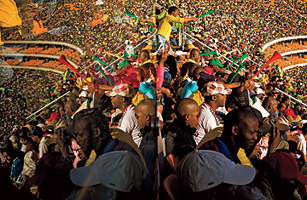
Fans watch two local teams battle in the first match at Johannesburg's newly completed Soccer City Stadium.
(3 of 3)
A Voice of Hope
On April 5 this year, Africa's two greatest club teams, the Pirates and the Kaizer Chiefs, also from Soweto, met for the continent's most legendary fixture: the Soweto Derby. Though held a day's drive away at the new stadium in Durban, the match sold out in 12 hours. The game was unremarkable: the Chiefs eventually won 3-1 on penalties. The crowd didn't appear to notice. For two and a half hours, 60,000 fans wearing makarapas (miners' helmets decorated with feathers, slogans and giant Flavor Flav-type spectacles) danced, sang and deafened each other with vuvuzelas — 3-ft.-long (91 cm) plastic horns. Placards in the crowd proclaimed hastily scribbled messages of impulsive jubilation. "We are ready," read one. "Feelings is here," announced another.
The game was a reminder of another truth: if soccer changed Africa, Africans changed soccer. They made it more democratic — the number of places reserved for African teams in the World Cup rose from zero in 1966 to five today. They made it bigger business — Africa was the world's third largest TV audience for soccer in 2006. And they have produced so many international players that European soccer wouldn't be what it is today without African talent. Top teams such as Chelsea and Inter Milan rely on world-class talents like Ivorian Didier Drogba and Cameroonian Samuel Eto'o. The poorer teams of Eastern Europe count on the low wage demands of Africa's less illustrious players just to survive.
The most significant change Africa brought to soccer involved the way the game itself is played. The European game was historically played with round leather balls on standardized pitches. Such an orderly setting often encouraged a disciplined, methodical game that sublimated the individual to the team. Many Africans, by contrast, grow up playing barefoot on rutted streets, kicking anything — a can, a straw basket, a ball of rubber bands — that rolls. That requires aptitude, spontaneity and creativity "just to keep the ball in play," says Jordaan, and tends to produce the most brilliant of stars, individuals of jaw-dropping skill. A European machine inspired by a few African magicians is now the signature style of many of the world's most successful teams. Soccer is a lot more fun too, nowhere more so than in a stadium with a singing, dancing African crowd. "Fans in Africa move to a different drum," says Alegi. "And it's a very loud one."
So try to imagine the atmosphere at that first game on June 11. It will be raucous — 94,000 people bursting with pride and happiness and accomplishment. But for a few minutes, at least, and before a single ball is kicked, the crowd will likely be in tears. Quietly surveying Soccer City as Jordaan gave away tickets to those who had built it was Siphiwo Ntshebe, a 36-year-old tenor of growing international fame. His audacious journey from a township choir on South Africa's southern coast to a music scholarship in London and a five-album deal personified Africa's transformation. For the past few months, Ntshebe had had a new job: coaching Mandela. The pair was practicing duets of South Africa's national anthem. They were also, said Ntshebe, working on and recording "a new song about hope for Africa and the world" that Mandela co-wrote and on which Ntshebe sings while Mandela intones, "The generosity of the human spirit can overcome all adversity. Through compassion and caring, we can create hope."
The plan was for Ntshebe to perform the song accompanied by Mandela's recorded voice before Mexico and South Africa took the field in the opening game. Ntshebe confessed he was a little worried about Mandela, who, at 91, is easily tired and was not always up to practice. Though on other days, Ntshebe said, "he's very good. He can get really high." Tragically, it was to be Ntshebe who wouldn't make it. On May 24, after contracting acute bacterial meningitis, he died at Livingstone Hospital in Port Elizabeth.
Jordaan says he will still play a recording of Ntshebe and Mandela at the opening ceremony. It will be heartbreaking, for sure, but it could also be, as Ntshebe intended, the most sublime of African revolutions. On June 11, a billion people will tune in to watch the biggest event in the world — and find an African team about to play an ever more African game on the edge of Africa's most famous township. And then the greatest man on earth will speak of hope.